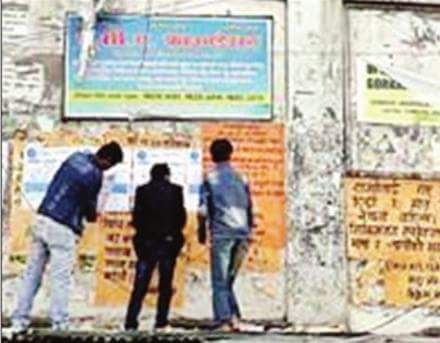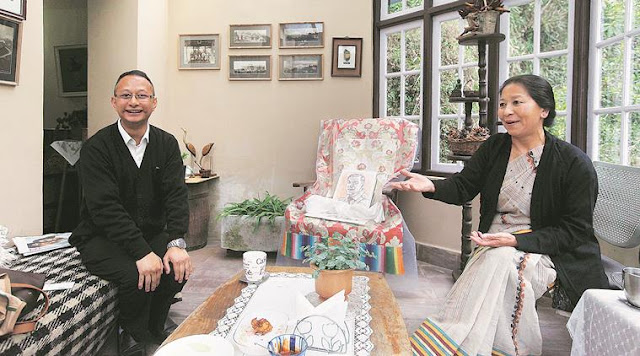Write: Debjyoti Chakraborty & Pramod Giri
The era of middle class and westernised Nepali leaders with their humble followers has all but faded away in the northernmost territories of West Bengal but violence still seethes in the three hill sub-divisions — Darjeeling, Kurseong and Kalimpong. The key to making sense of it all lies between the stories of Bimal Gurung and Bharati Tamang, along a continuum that rises from salt-of-the-earth politics to peaks of frightening violence.
Madan Tamang was a suave businessman, and the rebel voice who owned a piece of the Berlin Wall. He was more exception than rule, and the manner of his death only exposed the dark side of aspirational Gorkha politics, as did the lack of aftermath.
Bharati is still in a state of shock. After her husband’s violent death on May 21, 2010, people trooped in with their condolences, but no one raised a voice against the killing. “I ask them why they kept mum when Madan’s neck was almost severed with a khukri and the culprits are still roaming around? They have no answer.”
At one level, Tamang’s brutal death was but a spike in Gorkha discontent. It was in the mid-1980s that the discontent among the tea garden workers and the long suppressed opposition to ‘Bengali colonialism’ — the ‘babus’ took over when the ‘sahibs’ left — first found its voice in a former army man who sought a separate state for Gorkhas — all those who live in the hills, not just Nepali-speakers.
Subhash Ghising had burst upon the scene. The Gorkha National Liberation Front (GNLF) leader found a support base among the urban youth, who had no job opportunities other than the tourism industry, and the organised labourers in tea gardens.
Ghising’s road ahead was quite clear, since by the time the GNLF emerged, the CPI(M) trade unions had lost much of their clout. Sub-nationalism took centrestage.
Gurung, says one Darjeeling-based political observer, is the real political successor of Ghising, although it is he who drove the GNLF patriarch from the hills on July 26, 2008. Ghising died a broken man on January 29 this year, “in exile” in Siliguri.
Gurung, the new Alpha male, saw his opportunity when Ghising accepted a ‘mock state’ — only an autonomous district administration. Gurung formed his own party, the Gorkha Janmukti Morcha, on October 7, 2007. The Gorkhaland flag kept flying.
The demands are the same, the sentiment identical. Even the path is similar, if not exactly parallel. What’s different is the man at the top. Gurung is accessible, the big brother always ready to listen, but one who can turn extremely aggressive if things are not to his liking.
But Gurung is a worried man these days. On September 30, the GJM’s youth wing held a huge rally in Kalimpong. The trigger: the resignation of Kalimpong MLA Harka Bahadur Chhetri from the party. One of the GJM’s three MLAs, Rohit Sharma, had quit the assembly. Another one, Trilok Kumar Dewan, quit both the assembly and the party. But Chhetri just quit the party and retained his assembly seat. That’s why the rally, and it’s location in Chhetri’s home turf.
Gurung wanted his three MLAs from Darjeeling, Kurseong and Kalimpong to resign from the assembly to protest against CM Mamata Banerjee’s increasing interference, from controlling funds to setting up separate development boards for not only non-Nepali ethnic groups but also some Nepali-speakingsubgroups.
Why should separate boards be set up when there’s an elected autonomous territorial administration formed through a tripartite agreement between the state, the Centre and the GJM, reasoned Gurung’s outfit.
For Gurung, the latest Trinamool inroads represent more than just vote-bank politics. He considers them a direct attack on Gorkha identity. The Mamata effect is most evident in Kalimpong, where Trinamool flags and posters of Didi are everywhere. It hurt more as there were rumours that Chhetri, an intellectual icon of the Gorkha hills, a man fluent in Nepali, Hindi, English and Bengali, may soon join hands with Banerjee. In fact on September 30, when Gurung was addressing the rally in Kalimpong, Chhetri was in Kolkata.
Chhetri and his followers started organising small rallies from September 10, demanding district status for Kalimpong subdivision — a counter to Gurung’s statehood demand.
When these correspondents reached the Kalimpong rally site, poets were regaling the audience with sarcasm and, of course, how the Gorkhas had been suppressed since 1962 when then chief minister Bidhan Chandra Roy argued that the Nepalis were not in a majority in the hills as their language was not spoken by all the hill people.
The people were hooting, laughing and roaring. But no one left his or her seat. No one rushed to the dais where the leaders were seated. The reason: samarpan, anushasan, ekta (surrender, discipline and unity).
Most of the cadres, however, are not bothered that there’s no space for democracy, though. But that’s the reason, people think, Gurung’s two MLAs Chettri and Dewan, have left him.
And when Gurung rose to speak, the decibel level was almost unbearable. The next half an hour was a lesson on how to control the crowd with just words, camaraderie and threats to the government. The rider was: “Our movement will be peaceful. We’re from the land of Gandhi.”
But the possibility of violence is always alive in the hills. GNLF general secretary Mahindra Chhetri confirmed later in Siliguri that his party was preparing for a violent showdown with Gurung, and that the next election would see the return of the Ghising clan to the hills.
Mann, Ghising’s son and the GNLF president, kept smiling awkwardly when the GNLF general secretary, a former CPI(M) leader, kept on blazing away against the GJM, and not, interestingly, so much against Banerjee.
After the Kalimpong rally, these correspondents met Gurung at a hotel on a remote hilltop outside Kalimpong. There’s only one potholed approach road to the hotel and every car that took that road was being monitored. There were cadres everywhere, fanned out to spot any trouble.
We found him at the lobby of the hotel, surrounded by his aides, friends, supporters and, of course, favour-seekers. We waited till he managed to shoo them away and led us to a room to tell us about his life — the story of a boy from the tea gardens.
Gurung speaks plainly, but beneath all that bonhomie and good-natured banters, one can sense the simmering violence. The GJM is waiting, prepared for ambushes from the plains.
Source: Hindustan Times













